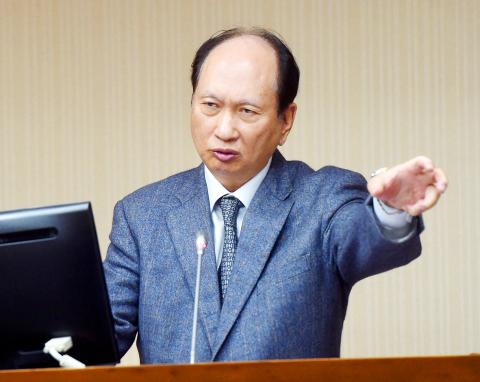Any equipment made by Huawei Technologies Co (華為) or ZTE Corp (中興) is to be quickly eliminated after a review of past government procurement cases, Minister Without Portfolio Wu Tze-cheng (吳澤成), who chairs the Public Construction Commission, said yesterday.
Wu made the statement at a meeting of the legislature’s Transportation Committee, which was reviewing the commission’s budget for fiscal 2019.
Taiwan in 2013 banned the use of core telecoms equipment manufactured by Chinese companies, the National Communications Commission (NCC) said on Saturday, after US magazine The National Interest reported on the risks that such equipment could pose to Taiwan’s security.

Photo: Chien Jung-fong, Taipei Times
The magazine cited Kitsch Liao (廖彥棻), a Taiwan-based cybersecurity specialist, as saying that Huawei has built backdoors into its hardware that serve as a dual threat to communications, enabling both espionage and sabotage.
Democratic Progressive Party legislators Cheng Pao-ching (鄭寶清) and Lin Chun-hsien (林俊憲) asked Wu how the government regulates telecoms’ use of Huawei products.
Cheng said that in 2012 some telecoms were found to be using core network technology built by Huawei.
The National Security Bureau in 2013 said that the Investigation Bureau and Presidential Office had used the company’s wireless network adapters.
The commission should quickly inform telecoms that are involved in government procurement that they are banned from using core equipment made by Huawei and ZTE, Cheng said, adding that telecoms should work with the NCC to dispose of such equipment that is still in use.
The US National Defense Authorization Act bans US government agencies and contractors from using products from Huawei and ZTE, while Australia, India and the UK have similar rules, Cheng said.
Wu said that the Public Construction Commission would do as Cheng asked and would circulate a reminder regarding the regulations.
The Government Procurement Act (政府採購法) stipulates that government agencies can set regulations governing the participation of foreign suppliers in government procurement cases, Wu said.
Separately, Presidential Office spokesman Alex Huang (黃重諺) told a news conference that the administration of President Tsai Ing-wen (蔡英文) is not using any telecom equipment that is the subject of national security concerns.
The administration has been paying close attention to issues related to information security as have other democratic nations around the world, Huang said.
Additional reporting by staff writer

CHAOS: Iranians took to the streets playing celebratory music after reports of Khamenei’s death on Saturday, while mourners also gathered in Tehran yesterday Iranian Supreme Leader Ayatollah Ali Khamenei was killed in a major attack on Iran launched by Israel and the US, throwing the future of the Islamic republic into doubt and raising the risk of regional instability. Iranian state television and the state-run IRNA news agency announced the 86-year-old’s death early yesterday. US President Donald Trump said it gave Iranians their “greatest chance” to “take back” their country. The announcements came after a joint US and Israeli aerial bombardment that targeted Iranian military and governmental sites. Trump said the “heavy and pinpoint bombing” would continue through the week or as long

TRUST: The KMT said it respected the US’ timing and considerations, and hoped it would continue to honor its commitments to helping Taiwan bolster its defenses and deterrence US President Donald Trump is delaying a multibillion-dollar arms sale to Taiwan to ensure his visit to Beijing is successful, a New York Times report said. The weapons sales package has stalled in the US Department of State, the report said, citing US officials it did not identify. The White House has told agencies not to push forward ahead of Trump’s meeting with Chinese President Xi Jinping (習近平), it said. The two last month held a phone call to discuss trade and geopolitical flashpoints ahead of the summit. Xi raised the Taiwan issue and urged the US to handle arms sales to

State-run CPC Corp, Taiwan (CPC, 台灣中油) yesterday said that it had confirmed on Saturday night with its liquefied natural gas (LNG) and crude oil suppliers that shipments are proceeding as scheduled and that domestic supplies remain unaffected. The CPC yesterday announced the gasoline and diesel prices will rise by NT$0.2 and NT$0.4 per liter, respectively, starting Monday, citing Middle East tensions and blizzards in the eastern United States. CPC also iterated it has been reducing the proportion of crude oil imports from the Middle East and diversifying its supply sources in the past few years in response to geopolitical risks, expanding

OTHER OPTIONS: Given possible US intervention and Taiwanese counterattacks, China might opt to blockade Taiwan or take its outlying islands instead of an all-out invasion A US think tank has urged Taiwan to adopt a “hellscape” strategy that would flood the Taiwan Strait with drones and other uncrewed systems to deter invasion by China. In its report, Hellscape for Taiwan, published on Thursday, the Center for a New American Security said Taipei’s asymmetric defense approach — often described as a “porcupine strategy” — needs to evolve to keep pace with the growing capabilities of the Chinese People’s Liberation Army. The “hellscape” strategy involves saturating the air and waters around Taiwan with thousands of drones and other platforms capable of striking invading forces from multiple domains at once. Long-range